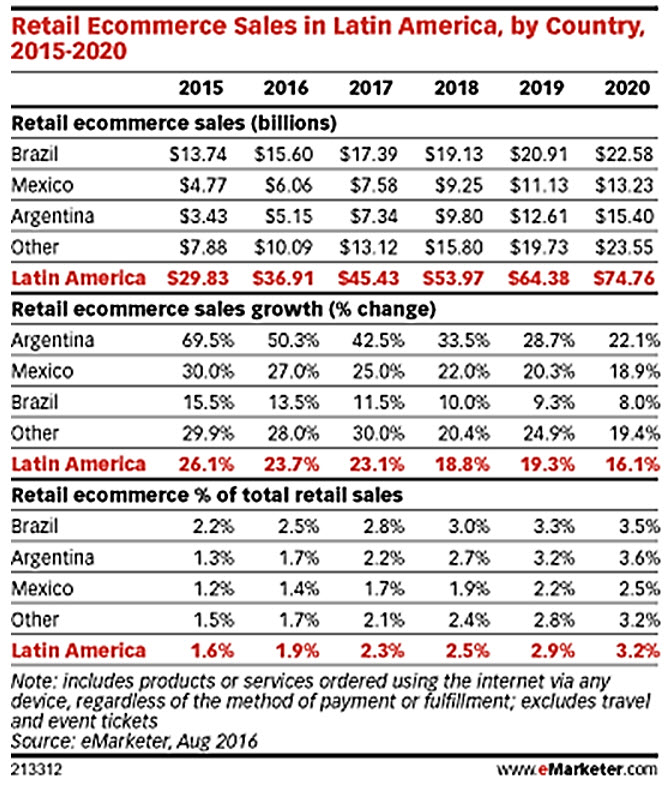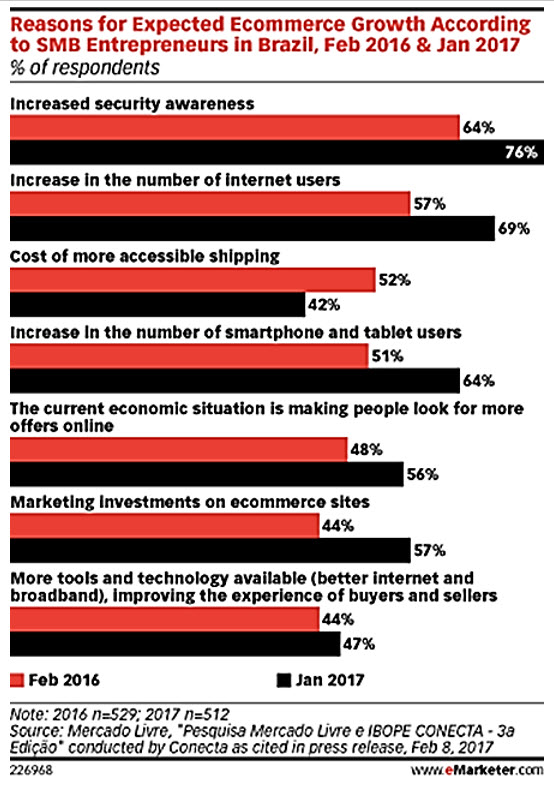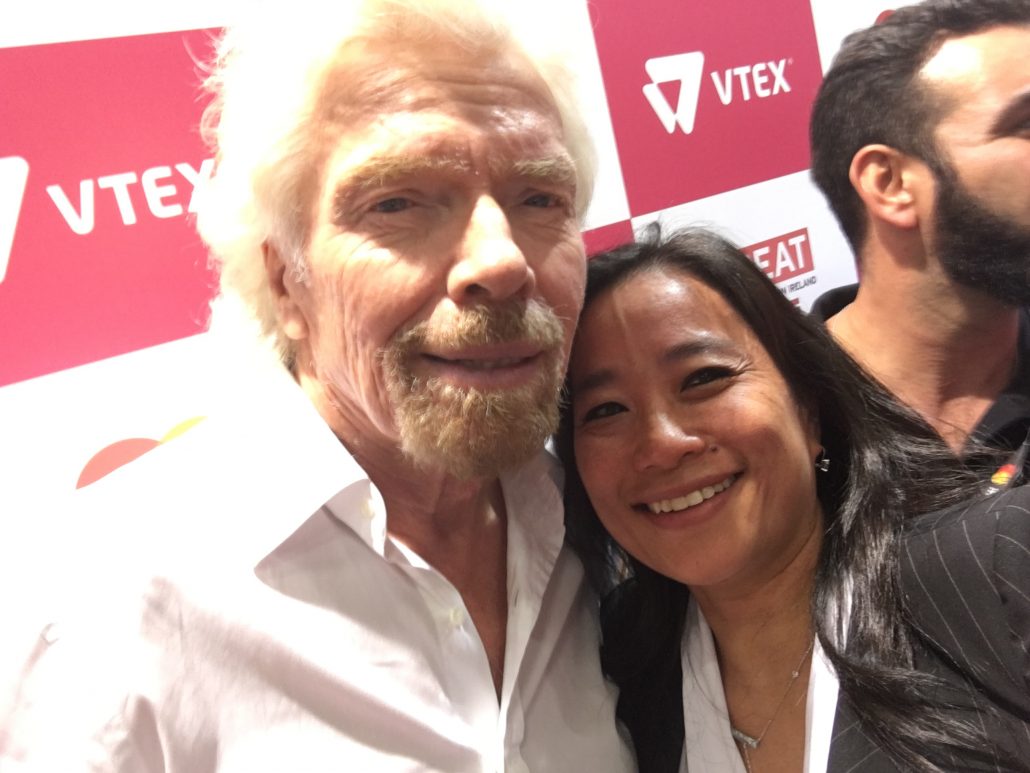
[1] Brazil is on a most people’s bucket lists; if not, it should be.
Why wouldn’t it be? It sounds exotic like the Amazon, decadently fun like New Orleans, and friendly like the Portuguese and Spanish. Though the timing was difficult for me (which meant that I didn’t have time to visit the Amazon), I was very excited and grateful that I’d been invited to speak at “VTEX DAY”, the largest ecommerce event in Latin America with more than 10,000 people, organized by ecommerce platform provider VTEX. I share my musings below but, bottom line, Brazil should be on everyone’s bucket list!
[2] Latin America is at double digit ecommerce growth – since 2015 and projected through 2020.
Brazil is the most digitally mature country, with Argentina and Mexico following suit. Ecommerce as a share of retail sales is growing across the board, as one would expect. Brazil’s early rapid growth rate may be slowing down slightly.
Another speaker, Aron Bohlig, CEO of retail investment banking boutique ComCap, shared with me: “Brazil has frequently been in the news of late with commentary on political and economic turmoil but, in the dozens of conversations I had with retailers, marketplaces, and service providers, none of this was in evidence. All of the attendees were optimistic about the growth of their ecommerce businesses.”

[3] A variety of key indicators are driving ecommerce growth in Brazil.
Brands and retailers are poised to take advantage of the increased demand. A combination of users feeling more confident in security, better marketing by retailers, and the economic situation seem to be the top reasons.
Fermin Caro, also from ComCap and former resident of Sao Paulo, was impressed by the breadth of the ecosystem. In speaking to parties from Chile, Colombia, Argentina, Ecuador, Mexico and Brazil, he learned that all had substantial YOY growth, owing much of it to referrals from ecommerce platform and conference host, VTEX.

[4] Brazilians have a great balance of confidence, humility, thirst for knowledge and mojo.
Yes, I said mojo, and they really embody it! The entrepreneurialism I saw in the VTEX team as well as the many partners and vendors and innovators was impressive. It’s sometimes dangerous to think that just because a country’s economy or industry aren’t as modern as the US, their innovation is behind. Not true. The conversations and solutions were as up-to-date and forward-thinking as I’ve seen in North America and Europe. The combination of confidence and humility is an extremely attractive cultural trait, creating motivated teams that can operate in reality, yet strive for success.
[5] Brazilian retailers are tackling the same opportunities and challenges as the US.
Stunted economic growth, tight margins, competition (especially between brick-and-mortar and pureplays), omnichannel (an anywhere/any time/any how customer experience), digital marketing, attribution, shipping, talent acquisition and retention. Yet, in speaking to business leaders, I found the spirit of “We can do this” and “Let’s do what we can anyway” to be refreshing.
Aron Bohlig notes: “Like TaoBao and Tmall in China, and the Amazon.com/marketplaces in the U.S., a large majority of ecommerce sales are conducted through marketplaces, with Mercado Libre (similar to eBay and present across Latin American) and B2W (similar to Amazon.com and primarily present in Brazil) dominating. Challenger cross-border marketplaces, such as Alibaba and Amazon, are helping to shift additional retail sales online by offering new products and new discovery options for consumers.”
[6] Brazilian people are genuinely hospitable and nice.
I don’t think they’ve received the infamous Ritz Carlton customer service training, where a housekeeper is empowered to help a guest with any request to conclusion, but it sure felt like that. Any request or question was met with a commitment to “make it happen” and see it through. This serves them well in a service industry.’
In thinking about the service provider market, I agree with Aron’s observation: “Retailers are still at an early stage with their own direct-to-consumer efforts. Broadly, the state of ecommerce is probably five years behind that in the United States. Obviously, Latin America is comprised of countries with different languages, cultural practices, tax and logistics circumstances, making it challenging for retailers to sell to the whole market.
The service provider landscape in Latin America is highly fragmented, presenting an opportunity for many. For example, there are many more retail ERP systems in Latin America than in the United States, where consolidation has taken place over the last fifteen years.
Conversely, VTEX’s ecommerce platform is the dominant platform in the market, with over 2000 retailer clients selling $2bn annually. While there is a growing number of retail-focused systems integrators and agencies, most of the work is still done internally by retailers or by generalist professional service providers. Again, opportunity for many.”
[7] Brazilians think and act globally and universally.
They feel like they represent Latin America and have a responsibility to connect with other Latin American countries. In a special session for international guests, each country was called out to stand, so we could all take notice and meet each other. Standing for the U.S. was the closest I’ve come to carrying the American flag at the Olympics.
We were also hosted by the British Embassy – unusual for an ecommerce event. And that’s the thing. It wasn’t just an ecommerce event; it was a global event where the conversation went beyond ecommerce. I think Brazilians actually act more like citizens of the world than most of us. They are multi-lingual, multi-ethnic, multi-cultural; Sao Paulo looks like NYC with Latin-, Asian-, White-, Black-Brazilians mixed fairly equally.
So, while the culture and foundation is there, there is much more work to be done on the ecommerce front. As another speaker, Chau Banks, CIO at U.S. retailer New York & Company, shared with me: “South American/Latin markets appear to operate independently and don’t have a clear or consistent unified cross-border program or process yet – something that will have to be prioritized in order to be truly global. There are also opportunities to have more conversation and education on payments and wallet transactions, especially given the high mobile usage in these countries.”
[8] Richard Branson is on tour and he has powerful messages.
I’ve now seem him speak twice at major events and, in addition to his business success (300 companies!) and visionary mojo (Virgin Galactic shuttles to space and a future space hotel), he is personally primarily focused on and directs his speaking fees to his Foundation and charity work. See: Virgin Unite, The Elders, Ocean Unite, Carbon War Room, and The B Team. I could watch his videos over and over and still get butterflies in my stomach – the kind that fills us with joy but also reminds us that we’re not doing enough for this world, our planet or humanity. My favorite quote from Branson: “Screw it, just do it.”

[9] Brazilians know how to have fun. Like really have fun.
From the 1:1 conversations, to small groups, to bubble football (see photo), to hiring THE Beyonce/Madonna-equivalent pop star Ivete Sangalo for a full concert, to – yes! – a zipline that ran from the back of the concert, over the crowd, to the side of the stage for anyone to do – BRAZILIANS EQUAL FUN. This would NEVER happen in America. While at IRCE the week after, I did wonder enough what a zip line would be like across that hall of 400+ exhibitors that I suggested it to the IRCE organizers.
[10] The world is welcome in Brazil and they know how to show it.
VTEX organizers and team were awesomely welcoming, savvy and have a bright future. I’ve been to two Olympics – Atlanta and Sydney – and strongly believe that an Olympics should be on everyone’s bucket list. The spirit and feeling of world humanity and connectedness is unimaginable until you experience it. I didn’t make the Rio Olympics but I think the Brazilians have that world view – and certainly the team at VTEX and the VTEX DAY they put on felt more for the digital community than for themselves. Congratulations and thank you to the VTEX team!
